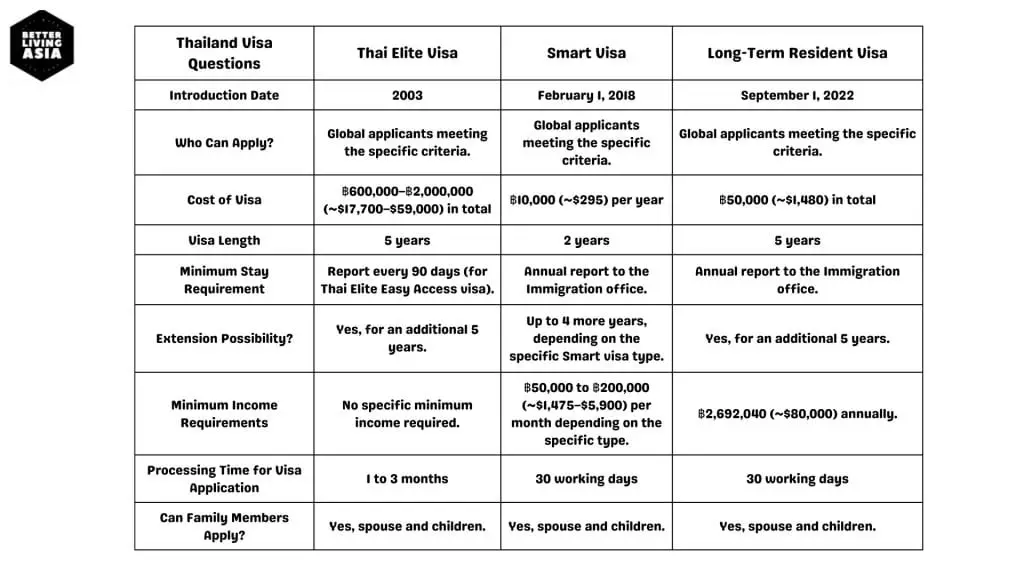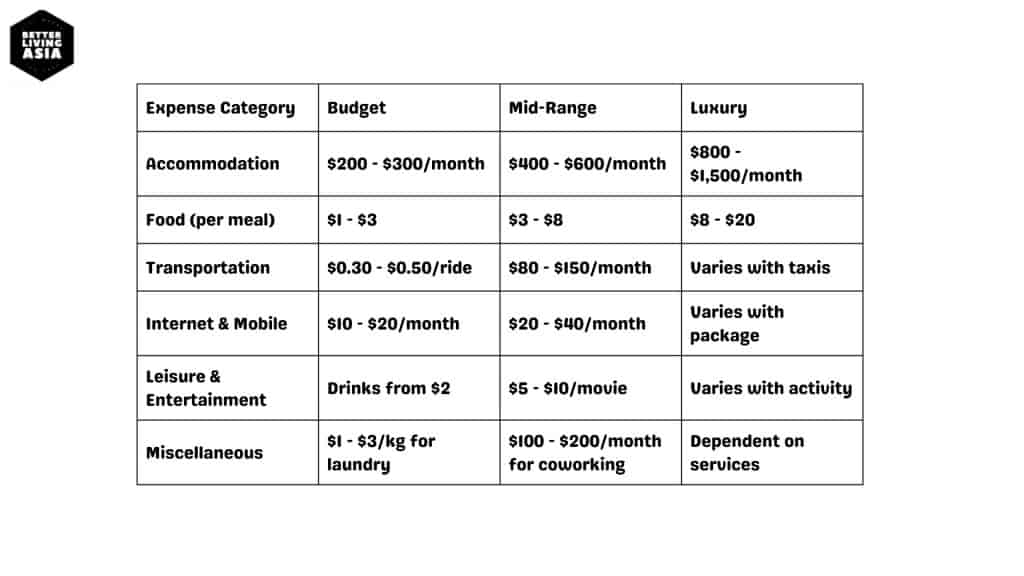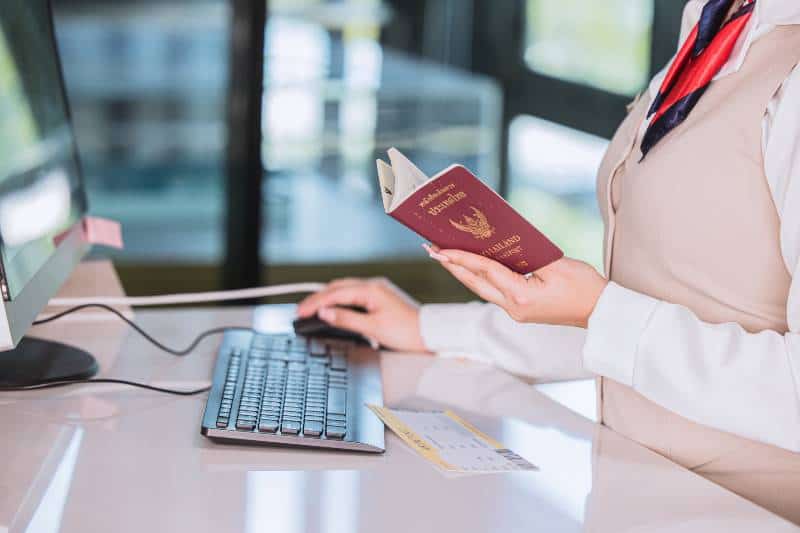Why Thailand’s Digital Nomad Visa is a Game-Changer
Are you someone who has always dreamed of living abroad but couldn’t figure out how to combine making a living with a lifestyle like that? That dream can now become a reality thanks to the Thailand Digital Nomad Visa, which allows people from certain countries to take on remote working roles while living in Thailand for extended periods. With its stunning beaches and vibrant culture, Thailand is an ideal destination for digital nomads looking to make their work-life balance dreams come true. In this blog post, we’ll be discussing how you can make use of the Thailand Digital Nomad Visa and why it’s such an amazing opportunity!
Thailand stands as a top choice among digital nomads in Southeast Asia. Unlike its counterparts, Thailand offers a diverse range of visa options tailored to remote workers, digital nomads, and location-independent entrepreneurs. This makes it an attractive destination for those seeking flexibility and freedom in their professional pursuits.
Key Takeaways
- Thailand’s Digital Nomad Visa offers remote workers an opportunity to legally reside and work in the country, further establishing Thailand as a top destination for digital nomads.
- To obtain the visa, applicants must meet certain eligibility criteria and adhere to the rights and limitations associated with it, ensuring a beneficial arrangement for both digital nomads and the Thai government.
- With affordable living costs, a rich cultural experience, and abundant resources for digital nomads, choosing Thailand can be both a professionally rewarding and personally enriching experience.

What is the Thailand Digital Nomad Visa?
The Kingdom of Thailand offers not 1 but 3 visa types that digital nomads from all over the world can apply for.
Depending on your income and preferences, you can choose among the following visas:
- Thai Elite visa,
- Smart visa, and
- Long-Term Resident visa.

Whether you’re looking for a visa with no income requirements, like the Thai Elite visa, or prefer a visa with a shorter initial commitment like the Smart visa, there’s likely an option that aligns with your circumstances. Always consult with the Thai embassy or an immigration consultant to ensure you’re making an informed decision.
Benefits and Advantages for Digital Nomads:
- Extended Stay: One of the most prominent advantages of this visa is the ability it grants digital nomads to stay in Thailand for longer durations, often up to a year or more. This means you can immerse yourself in the culture, learn the language, and truly make Thailand your home away from home.
- Ease of Compliance: With this visa, digital nomads no longer need to engage in the so-called “visa runs” – short trips outside the country to renew tourist visas. This not only saves time but also ensures you’re working in Thailand within the legal framework, giving you peace of mind.
- Access to Amenities and Services: Digital Nomad Visa holders often have access to co-working spaces, networking events, and other services tailored for the digital nomad community. Imagine working on your latest project in a vibrant co-working space in Bangkok, and later, heading to a seminar on global remote work trends.
- Boosting Local Economy: This visa encourages digital nomads to spend more in the local economy. Whether it’s renting an apartment, dining out, or engaging in recreational activities, your extended presence becomes beneficial for local businesses.
- Cultural Experience: Staying longer in Thailand gives digital nomads the opportunity to deeply engage with the local culture. From mastering your favorite Thai dish in a cooking class to joining traditional festivals, the experiences are endless.
- Networking: With the influx of digital nomads attracted by the visa, Thailand becomes a melting pot of global talents. This offers immense networking opportunities. Perhaps, while sipping a Thai iced tea in Chiang Mai, you could bump into a graphic designer who’s perfect for your next project!
For instance, let’s consider Julia, a freelance app developer from Canada. Before the introduction of the Digital Nomad Visa, Julia used to visit Thailand as a tourist, often having to leave every couple of months to renew her visa. This was not only tedious but also disrupted her work routine. However, with the Digital Nomad Visa, she can now comfortably rent a beachside bungalow in Koh Samui, attend local tech meet-ups in Bangkok, and indulge in delectable Thai cuisine without the constant worry of visa expiration. She has peace of mind, an enriching cultural experience, and a thriving professional network.
In essence, the Thailand Digital Nomad Visa is a testament to the changing dynamics of work and globalization. It’s an invitation for talents around the world to experience the Land of Smiles while continuing their global professions. So, if you’re a digital nomad looking for a blend of work and cultural immersion, Thailand beckons you with open arms!
Eligibility Criteria
The Thailand Digital Nomad Visa, while inviting, has certain eligibility criteria to ensure that it benefits the right audience – the digital nomads and remote professionals who genuinely seek a balance between work and a taste of Thai culture. Let’s go through the eligibility criteria in detail:
Who Can Apply?
- Digital Nomads and Freelancers: The core audience for this visa includes digital nomads, freelancers, and self-employed professionals who earn their living by working online. This includes web developers, writers, digital marketers, graphic designers, consultants, and many other professions.
- Remote Employees: If you are employed by a company but can work remotely without being tied to a physical office, you can apply for this visa. This is suitable for those in roles that are location-independent.
Necessary Qualifications or Requirements:
- Proof of Employment or Freelancing Activity: Applicants need to show proof of their online employment or freelancing activities. This can be in the form of contracts, invoices, payment receipts, or letters from employers or clients stating the nature of the work and its duration.
- Minimum Monthly Income: The Thai government generally requires digital nomads to demonstrate a stable income to ensure that they can support themselves while living in Thailand. The specific amount can vary, but as an example, an applicant might need to show a monthly income of at least $2,000 (though this figure can change based on government policies).
- Health Insurance: Given the importance of healthcare, especially in a foreign country, applicants are typically required to have comprehensive health insurance that covers their stay duration in Thailand.
- Passport Validity: Your passport should be valid for at least six months beyond your intended stay period in Thailand. This is a standard requirement for most visa applications worldwide.
- Clear Criminal Record: A background check ensuring you have no serious criminal offenses is a common requirement. This ensures the safety and well-being of both visitors and locals.
- Visa Application Fee: Like all visas, there’s a fee associated with the Digital Nomad Visa. Ensure you check the latest fee details from the official Thai consulate or embassy website.
- Return or Onward Flight Ticket: Sometimes, you might be required to show a return or onward flight ticket to demonstrate your intention to leave Thailand after your visa expires.
For a clearer perspective, let’s take the case of Roberto, a digital marketing specialist from Brazil. When considering the Digital Nomad Visa for Thailand, Roberto gathered his work contracts, and his latest three months’ bank statements showing a steady income above the required minimum, and secured a health insurance policy covering his intended one-year stay. He also ensured his passport was valid for the next 18 months. With these documents and a clear record, Roberto smoothly applied for and received his Digital Nomad Visa.
Application Process
Thailand’s position as a prime destination for digital nomads has indeed led to some stringent requirements for its Long-Term Resident (LTR) visa program. Let me help you rephrase the information to make it more streamlined and reader-friendly:
To apply for Thailand’s Long-Term Resident visa, aimed at accommodating the rising tide of digital nomads, there are specific prerequisites to be aware of:
Basic Requirements:
- Valid Passport: Your passport should be up-to-date, with a minimum validity of six months.
- Substantial Monthly Income: Over the past two years, you must demonstrate a consistent annual income of no less than $80,000.
- Health Insurance: Acquire health insurance that lasts the entire visa period, covering at least $50,000.
Additionally, to qualify for the LTR program, potential applicants need to fulfill at least one of the subsequent criteria:
- Employment in a Major Firm: Be an employee with a minimum of three years’ tenure in a company listed on the stock exchange or one boasting yearly revenues of $150 million or more.
- Educational and Financial Merit: Possess a Master’s Degree and show earnings of a minimum of $40,000 annually for the preceding two years. Coupled with this, applicants should have:
- Significant Financial Assets: Demonstrate assets worth at least $1 million.
- Retirement Funds: For those 50 years and above, exhibit a stable income source (like a pension), amounting to a minimum of $80,000 annually.
- Investment in Thailand: Directly invest a minimum of $500,000 in avenues like Thai government bonds, real estate, or other significant financial ventures within the nation.
These guidelines serve to ensure that the applicants are genuinely committed to a long-term stay and are equipped to contribute positively to Thailand’s economy and society. If Thailand’s scenic landscapes, rich culture, and bustling cities beckon you, ensure you’re well-prepared with these criteria to embark on your Thai adventure!
Steps to follow
Navigating the Thailand digital nomad visa process can be quite a labyrinth for the global remote worker. Yet, fear not! We’ve distilled this intricate procedure into a quartet of straightforward steps, ensuring you a seamless visa application experience with a high likelihood of approval.
Step 1: Assemble Your Documentation
Applicants may identify with one of five categories: wealth-savvy globetrotters, affluent retirees, adept professionals, Work-from-Thailand experts, and family dependents. The document requirements vary a smidge across categories.
Zooming into the Work-from-Thailand professionals, here’s a checklist for your visa application:
- A current passport copy, ensuring a 6-month validity.
- A passport-sized photo (3×4 cm dimensions).
- Your most recent Curriculum Vitae (CV).
- Verification of related field employment spanning at least five out of the past ten years.
- A health insurance certificate covering the visa’s duration (with a baseline coverage of $50,000).
For those employed remotely, the following items are also a must:
- A detailed employment or service contract, undersigned by an authorized individual, outlining your role, contract specifics, and remuneration.
- A recent financial standing proof (like a bank statement).
- Documentation showing personal annual income tax returns – either an $80,000 for the most recent year or an average of $40,000 over the prior two years.
Where relevant, further documentation (such as higher education credentials) should also accompany your application.
Step 2: Launch Your Visa Application
The entire visa application procedure has been digitized for your convenience. Simply head to the official website, pick the right form that resonates with your professional category (be it a globetrotter, retiree, professional, Thai-work aficionado, or dependent), and submit. You can anticipate feedback within a brisk 20-day timeframe.
Step 3: Secure Your Visa Appointment
Upon a green signal for your application, the next waypoint is an appointment. This can be scheduled at a Thai diplomatic mission abroad or even within Thailand’s Immigration Offices. During this meeting, be prepared to settle the visa charge, which stands at 50,000 Thai baht per applicant.
Step 4: Retrieve Your Digital Work Permit
With the visa appointment behind you, it’s time to claim your Thai Digital Work Permit. The hub for this is the Department of Employment One Stop Shop Center, nestled in Bangkok’s heart. Note that there’s an upkeep fee of 3,000 Thai baht annually for this permit.
Cost of Living in Thailand
Thailand, with its enticing blend of vibrant culture, delicious cuisine, and scenic beauty, has become a magnet for digital nomads worldwide. The country’s cost of living can vary significantly depending on the region, but on average, it’s substantially more affordable than many Western nations. Here’s a breakdown:
Average Living Costs for Digital Nomads in Thailand
Accommodation:
- Budget: Hostels or shared rooms: $200 – $300/month
- Mid-Range: One-bedroom apartment in the city center: $400 – $600/month
- Luxury: Modern apartments or condos with amenities: $800 – $1,500/month
Food:
- Local Street Food: $1 – $3/meal
- Local Restaurants: $3 – $8/meal
- Western Restaurants: $8 – $20/meal
Transportation:
- Local Buses: $0.30 – $0.50/ride
- Motorbike Rental: $80 – $150/month
- Taxis: Starting at $1, with $0.50/km thereafter
Internet & Mobile:
- Mobile Plans: $10 – $20/month
- High-Speed Internet (for home): $20 – $40/month
Leisure & Entertainment:
- Local Bars: Drinks starting at $2
- Cinemas: $5 – $10/movie ticket
- Fitness Centers: $20 – $60/month
Miscellaneous:
- Laundry: $1 – $3/kg
- Coworking Spaces: $100 – $200/month
Table: Cost of Living in Thailand

Recommendations for Budget-Friendly Living:
- Embrace Local Cuisine: Indulging in street food and local eateries is not just a treat for the palate but also the wallet.
- Use Local Transport: Tuk-tuks and local buses are a cost-effective way to traverse the city.
- Shop at Local Markets: Fresh produce and local goods are often cheaper than imported items in supermarkets.
- Rent Outside City Centers: Living a bit away from the prime areas can drastically cut down your accommodation costs.
- Use Mobile Data: Sometimes, mobile data plans can be more economical than home broadband, especially if you’re on the move.
Remember, while Thailand offers affordability, maintaining a budget and tracking expenses can help ensure you make the most of your time in this beautiful country without breaking the bank
Advantages of Choosing Thailand
Whether you’re a traveler, expatriate, or a digital nomad, the Land of Smiles has an abundance of charms just waiting to be discovered. Let’s dive into the delights Thailand has to offer.
1. Enriching Cultural Experiences
Thailand is a treasure trove of rich history, vibrant traditions, and diverse cultural tapestries. Immerse yourself in the rituals of the grand temples in Chiang Mai or witness the ethereal beauty of floating lantern festivals in the north. Fancy learning a traditional art? Why not take a Muay Thai class or learn the intricate steps of Thai classical dance? And we can’t talk about culture without mentioning the mouth-watering cuisine. From sizzling street food stalls serving spicy “Som Tam” (papaya salad) to upscale restaurants dishing out creamy green curries, the Thai culinary scene is a glorious adventure for your taste buds.
2. Top-notch Connectivity and Resources for Digital Nomads
Thailand, particularly places like Chiang Mai, Bangkok, and Phuket, has become a hub for the digital nomad community. With an array of co-working spaces equipped with high-speed internet, such as PunSpace or Hub53, you’re never far from a conducive environment to work. These spaces aren’t just about work, though. They offer an opportunity to network, share ideas, and connect with like-minded individuals from all corners of the globe. Moreover, most cafes and restaurants across major cities in Thailand offer free Wi-Fi, ensuring you’re always connected, whether you’re finalizing a project or sharing a stunning sunset snap on Instagram.
3. Favorable Climate and Unparalleled Natural Beauty
If you’re the kind of person who revels in sun-soaked days, Thailand’s tropical climate will feel like paradise. The country experiences warm weather throughout the year, interspersed with refreshing monsoon rains that turn the landscape into a lush shade of green. But beyond the favorable climate, it’s Thailand’s diverse natural beauty that steals the show. Seek solace on the pristine beaches of Krabi or Koh Lanta, where turquoise waters meet golden sands.
Venture north to the misty mountains of Pai, where you can rejuvenate amidst cascading waterfalls and hot springs. Dive deep into the waters around Koh Tao to explore coral reefs, or simply hike in national parks like Khao Sok to experience nature in its rawest form.
To further entice you to consider living in Thailand, have you checked out the article I wrote about their holidays? I must say, it’s absolutely amazing! Make sure to give it a read!
Possible Challenges
Navigating life as a digital nomad in Thailand is full of exciting adventures, but as with every expatriate experience, it can present a few hiccups along the way. Let’s explore these challenges with a friendly touch, and offer some practical solutions:
1. The Intricacies of Language
Challenge: Imagine heading to a local market in Chiang Mai, and the vendor doesn’t understand “avocado toast.” Beyond popular tourist spots, English might not be as commonly spoken.
Solution: Embrace the language adventure! Learn basic Thai phrases. Simple words like “Sawasdee” (Hello) and “Khob khun” (Thank you) can go a long way. Plus, you’ll see faces light up when locals see you’re making an effort. Mobile apps like Duolingo can be your language learning buddy, and you might even make new local friends by practicing conversations with them.
2. Trusty Internet, Where Art Thou?
Challenge: You’re in a quaint cafe in Pai, the mountains are calling, but alas, the Wi-Fi is slower than a leisurely elephant trek.
Solution: Scout out and bookmark reliable co-working spaces or cafes known for good internet. Investing in a local SIM card with robust data can be your savior during unexpected Wi-Fi downtimes. Pro-tip: Always ask fellow nomads for their top spots with the best connectivity.
3. Navigating the Maze of Visa Regulations:
Challenge: Thailand’s picturesque landscapes make you want to extend your stay, but visa regulations can sometimes rain on your parade.
Solution: Stay in the loop about current visa policies. Many nomads opt for periodic “visa runs” to neighboring countries. For a more long-term approach, delve into options like the Thai Elite or Smart visas. Engage with digital nomad communities online for firsthand advice and updates.
4. When Cultures Collide
Challenge: From showing affection in public to unintentionally raising your voice in a disagreement, cultural missteps can happen.
Solution: Dive deep into Thai culture. Read about it, watch documentaries, or even better, participate in local workshops or classes. Remember, it’s all about respect. For instance, always wai (a traditional greeting) back to someone, especially elders. And, joining local events or festivals can offer a genuine taste of Thai traditions.
5. The Tropical Tango
Challenge: Thailand’s sultry climate can leave you feeling like you’re perpetually in a sauna.
Solution: Adjust your daily routine. Consider working during early mornings or late evenings when the sun isn’t as fierce. Stay hydrated with tropical fresh juices (hello, fresh coconut water!) and always, always carry sunscreen. Investing in a good mosquito repellent can also prove invaluable.
6. Staying Healthy on the Go
Challenge: That spicy Tom Yum Goong soup might be delicious, but your stomach might occasionally beg to differ.
Solution: Moderation is key. Start with milder dishes before venturing into the spicier ones. Keep a handy travel medicine kit, and remember, while street food is tantalizing, always look for stalls that are popular with locals – they know best. Oh, and always prioritize bottled water over tap!
7. Finding Your Tribe
Challenge: While the digital nomad lifestyle is liberating, it can sometimes feel lonely without familiar faces around.
Solution: Engage in local digital nomad meetups, workshops, or community events. Platforms like Meetup or even Facebook groups can connect you with fellow nomads. These interactions not only fend off loneliness but also open doors to new collaborations and friendships.

Thailand Digital Nomad Visa FAQs
Can I work for any company or only Thai companies with this visa?
You can work for any employer with this visa, regardless of their nationality.
How long is the visa valid for and can it be renewed?
The Long-Term Resident Visa is typically valid for one year and can be renewed. It’s important to note that you have to renew the visa at least 45 days before its expiration date.
Can my family accompany me if I get this visa?
Yes, you can apply for a visa for your family members if you are granted the Long-Term Resident Visa. Each member of your family will need to submit their own application and provide all necessary documents.
What happens if I violate the terms of the Digital Nomad Visa?
In the event of any violations, your visa may be revoked. It’s important to understand and comply with all relevant regulations to avoid such a situation. Therefore, it’s highly recommended that you familiarise yourself with the local laws before applying for the Digital Nomad Visa.
Are there any tax implications for earnings while on this visa?
Yes, all earnings, whether in Thailand or abroad, are subject to taxes. It’s important to speak with a qualified financial advisor or tax expert before embarking on your digital nomad journey. This can help you avoid any potential tax liabilities and ensure that all earnings are correctly reported.
Conclusion
Digital Nomad visas provide countless advantages for remote workers residing in Thailand. Those wishing to make this beautiful country their home will find that with affordable living costs and a rich community culture, they can reap the best of both worlds. Additionally, the availability of resources for digital nomads makes it even easier for them to fully integrate into Thai society.
For anyone looking to jumpstart their location-independent lifestyle, obtaining a Digital Nomad Visa and living in Thailand is an excellent option.
So if you’re interested in applying for the Digital Nomad Visa and making Thailand your new home, Subscribe to our newsletter for the best information about living in Thailand or reach out to us with any questions you may have about obtaining a Digital Nomad Visa. We look forward to helping you live your best version of life in one of the most beautiful countries in the world!






